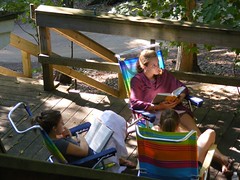It was four years ago today that I posted my first book review on
ricklibrarian, a brief introduction and a paragraph about
Hannah Coulter: A Novel by Wendell Berry, still one of my favorite books. Not sure whether I could sustain a blog, I put in a lot of early effort and posted for forty-something days in a row. I did keep it going, though not at that pace, and it is still here. I hope you enjoy it as much as I enjoy writing.

On this fourth anniversary, my thought are traveling back twenty years to another anniversary. In February 1989 I left my job as a reference librarian at the Suburban Library System's Reference Service to be a stay-at-home dad. Between taking photos of my daughter Laura and changing her diapers, mostly when she was napping, I found time to read. We soon got our first home computer so I could work from home as subcontractor to an information broker. Using an acoustic coupler and a phone, I dialed up Dialog, BRS, VuText, DataTimes, and Lexis databases for business information. I also used WordPerfect on the computer to start a reading list.
That reading list later became a database, and I now have the titles of everythingthat I have read for nearly twenty years. Yesterday, I entered all the titles from 2008 and 2009. They had been in the reading notebook that I got as a summer reading prize from the Downers Grove Public Library in 1995. Being caught up, I decided to sort the title and see what I might learn.
I first sorted by year and found that I did not really read much in 1989. From the date I began the list (not remembered) until the end of the year, I finished 19 books. Most were light fiction or baseball books, including
Summer of '49 by David Halberstam and
The Best Short Stories of Ring Lardner. I also read some funny books, including
PreHistory of The Far Side by Gary Larson and
The Minnesota Book of Days by Howard Mohr, the latter famous for saying "You bet!" and "Whatever" on the
Prairie Home Companion. I also read with interest
Microcomputers and the Reference Librarian by the late Patrick Dewey, an pioneering SLS librarian who helped many of us begin to use computers.
Next I sorted by author. I was surprised to find that I have read much more fiction than I would have claimed, most of it classics, mysteries, Southern writers, or Third World authors. In addition to Charles Dickens and George Eliot, there are mysteries by Margery Allingham, Charlotte MacLeod, Ellis Peters, and Alexander McCall Smith (often reading them right after Bonnie). The long list of P.G. Wodehouse titles shows that I have dipped into the silly world of Bertie and Jeeves quite often. In a more serious vein, I have tried many books by Doris Lessing, Muriel Spark, William Faulkner, Eudora Welty, and Wendell Berry. I have also read five books by Kenyan author Ngugi wa Thiong'o, as well as several Latin American authors.
I found that I have read twice as many memoirs as biographies. I was a little disturbed to learn that I read
The Life and Times of the Last Kid Picked by David Benjamin twice, in 2002 and 2007. How could I have not remembered that book five years later? Maybe it is a data error. I recently thought it might be interesting to read
Days of Grace: A Memoir by Arthur Ashe. Oops! I already did back in 1993. Maybe I will again.
My memory is not totally shot. In fact, reading over the lists, I have many visions of where I was when reading the books. I remember reading
The Moviegoer by Walker Percy outside a tent in a camp in the Serengeti in Tanzania,
The Coalwood Way by Homer Hickam outside a cabin in the Badlands in South Dakota, and
Sibley's Birding Basics by David Allen Sibley in the LITA Forum hotel in Houston. I also remember friends and family recommending titles. Among many titles, Bonnie gave me
The No. 1 Ladies Detective Agency by Alexander McCall Smith. Joyce Saricks gave me
The Remains of the Day by Kazuo Ishiguro. My blogging friends (listed to the right on this page) have recommended many others. Even that little girl in the picture above is now suggesting titles to me. These are lots of good memories.
The reading notebook, the database, and this blog all help me remember the titles of the many books that I have read. They also help me share. That's what this is all about.
 Several weeks before our trip to Florence and Rome, I was in Anderson's Bookstore in Downers Grove to look at the travel books. Walking past the fiction shelves, I spotted an inexpensive edition of A Room with a View by E. M. Forster. It was light and would take little room in my backpack. I bought it to read in Florence where the story opens and ends.
Several weeks before our trip to Florence and Rome, I was in Anderson's Bookstore in Downers Grove to look at the travel books. Walking past the fiction shelves, I spotted an inexpensive edition of A Room with a View by E. M. Forster. It was light and would take little room in my backpack. I bought it to read in Florence where the story opens and ends.

.jpeg)













